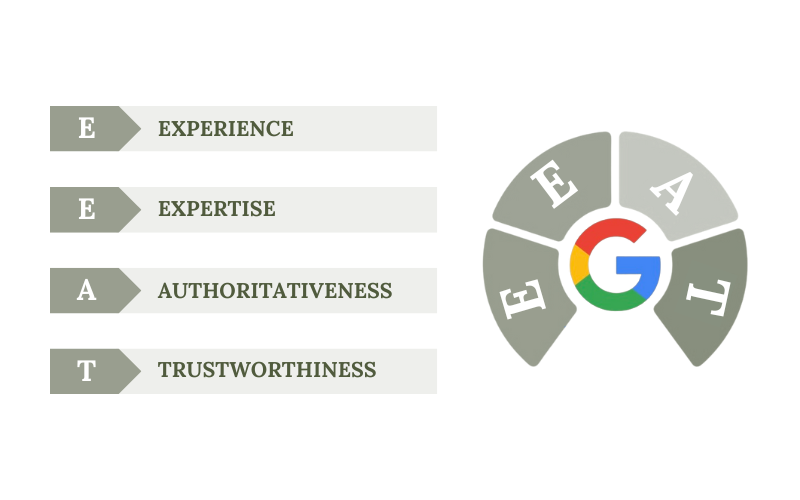You might’ve heard a bit about Google’s E-E-A-T guidelines and wondered how they affect your WordPress site, right?
Well, Google’s algorithm and guidelines are always in flux, aiming to ensure that search results prioritize top-notch, reliable content. And even though E-E-A-T isn’t a direct ranking factor, Google still wants to dish out results with solid E-E-A-T.
In this post, I’ll break down what E-E-A-T is all about and give you some tips on how to beef up your site’s E-E-A-T game. Let’s dig in!
What Is Google E-E-A-T?
Alright, let’s talk about Google E-E-A-T, or Experience, Expertise, Authoritativeness, and Trustworthiness, as Google sees it. Imagine it like this: Google has its own little team of evaluators called Quality Raters. These folks are like the referees of the internet, checking out search results and making sure they’re top-notch.

So, even though Google doesn’t directly say, “Hey, E-E-A-T is a huge ranking factor,” it’s still super important for your SEO game. Why? Because Google’s all about delivering the goods to users, and strong E-E-A-T means they’re getting quality stuff.
And here’s the kicker: when your site has high E-E-A-T, people trust it more. And when they trust it more, they’re more likely to stick around and even buy stuff.
Now, let’s rewind a bit and check out the timeline of E-A-T:
- In March 2013, Google drops its Search Quality Rating Guidelines.
- Then, in March 2014, E-A-T (Expertise, Authoritativeness, and Trustworthiness) makes its grand entrance into these guidelines.
- And in December 2022, Google’s like, “Hey, let’s add an extra ‘E’ for ‘Experience‘” and boom, E-E-A-T is born.
So, let’s dig into each part of Google’s E-E-A-T framework and see how it all connects with your content.
Experience
When you’re browsing online, keep an eye out for content that reflects the creator’s firsthand experience. This type of content isn’t just about sharing ideas – it’s about showing that the suggestions have been put to the test. That way, you know you’re getting authentic insights.
Imagine you’re searching for tips on starting a home garden. You stumble upon a blog post where the author shares their own journey of trial and error, detailing what worked and what didn’t. This firsthand account not only provides valuable insights but also reassures you that the suggestions are based on real experiences.
Expertise
When Google’s search quality raters assess web content, one crucial factor is evaluating whether authors demonstrate expertise. It’s all about figuring out if they’ve got the know-how, qualifications, and credentials to deliver trustworthy information.
Now, expertise isn’t just about having years of experience. It’s a bit different.
Let’s take the topic of saving money, for instance.
You’ve got folks who prefer advice from certified financial experts. That’s expertise talking. Then there are those who crave real-life stories and strategies that worked for regular people like them. That’s where experience shines.
Here’s the kicker: Both types of content can be super helpful to searchers. That’s why they can both hit the mark in Google E-E-A-T book.
Authoritativeness
So, think of authoritativeness like your reputation in your field – it’s how much the big shots and influencers in your area respect you.
When Google quality raters do their thing (you know, those folks who check out how legit websites are), they’re looking at how authoritative the creator, the content, and the website are.
Take, for instance, an article about abdominal pain on WebMD. It’s considered authoritative because:
- WebMD is a big deal in the medical advice world.
- The authors – they’re pros, like health experts from WebMD Editorial Contributors.
- They even double-check with experts, usually doctors, to make sure their info is spot-on.
Basically, if other bigwigs in your field are linking to your stuff, it’s a good sign. It means your content rocks and adds value.
So, in simpler terms, when people know you, your background, and see you as a leader in your industry, they trust what you say. You become their go-to source for solid info.
Trustworthiness
When it comes to Google E-E-A-T SEO, trustworthiness reigns supreme. Quality Raters need to consider the credibility of the creator, the content itself, and the overall website.
Make it crystal clear who’s behind your content, ensure factual accuracy, back up claims with reliable sources, and steer clear of burying valuable content beneath a barrage of ads.
Remember, this extends beyond just content marketing. Google’s Search Quality Rater Guidelines highlight the importance of trustworthiness, flagging issues like insecure shopping checkout pages.
And don’t forget about contact information, especially for Your Money or Your Life (YMYL) topics and online stores. It’s all about building trust with your audience and with Google’s algorithms.
What Is YMYL?
So, you know those topics that really hit close to home? The ones that could seriously impact your health, wallet, safety, or overall well-being? Yeah, those are what we call YMYL (Your Money or Your Life) topics. We’re talking about stuff like finances, medical advice, and current events that could make a big difference in your life.
Now, why does Google care so much about E-E-A-T when it comes to YMYL stuff? Well, because getting the wrong info on these topics can really mess things up for:
- You, the person reading the stuff.
- Folks around you who might be influenced by what you read.
- Even larger groups impacted by actions spurred by that info.
Let’s break it down with some examples straight from Google’s playbook:
- Clear-cut YMYL stuff: like knowing how to bail when a tsunami’s heading your way, keeping up with ongoing violence, or getting the scoop on prescription drugs.
- Maybe-sorta YMYL: things like weather forecasts, car accidents in the news, or how often you should swap out your toothbrush.
- Not really YMYL: stuff like who snagged the latest music award, local high school sports updates, or your favorite music video.
Now, here’s the deal: there are loads more YMYL topics out there. But according to Google, it’s up to quality evaluators to decide if a page hits that YMYL mark. And for those pages to make the cut, they’ve gotta show off some seriously top-notch E-A-T.
So, while E-E-A-T and YMYL might not be the secret sauce for SEO rankings, they’re biggies when it comes to serving up quality content that won’t steer you wrong.
How Does Google E-E-A-T Affect SEO?
You ever come across something online and wonder, “Can I really trust this?” Like, it’s written by someone who might not know what they’re talking about, and you’re left scratching your head. Well, Google’s got your back with its E-E-A-T guidelines.
Basically, Google wants to make sure that what they show you is legit and not just some random person’s thoughts. Especially when it comes to important stuff like health, safety, or money, you wanna know you’re getting solid advice, right? Google takes this seriously, calling it YMYL – Your Money or Your Life. They don’t want to be spreading misinformation that could mess with your well-being.
So, next time you’re browsing the web, remember Google E-E-A-T guidelines are there, making sure you’re getting the good stuff and not just a bunch of baloney.
How Does Google E-E-A-T Help SEO?
Alright, let’s break down how Google E-E-A-T fits into your SEO game, especially with Google keeping tabs.
First off, E-A-T isn’t your typical ranking factor. It’s more like a guideline in Google’s playbook for those who rate search quality worldwide.
Here’s the deal: Understanding E-A-T and playing by its rules can give your site an SEO boost, indirectly nudging it up the search ladder. Especially when you’re gunning for those competitive keywords, especially in the YMYL (Your Money or Your Life) topics.
Now, here’s the tricky part: you can’t just whip out a ruler and measure your E-A-T score. Nope, it’s not that simple. But fear not, Google’s guidelines offer some clues:
- Top-notch sites flaunt very high E-A-T. They’re packed with expert articles, the ones you can trust blindly.
- Then there’s the high E-A-T crew. They dish out content dripping with firsthand knowledge, earning trust along the way.
- On the flip side, sites lacking E-A-T might have other perks but miss the mark on expertise in their niche.
- And finally, the bottom feeders—sites with the lowest E-A-T feel downright spammy, offering a crummy user experience.
So, the takeaway? Aim high. Building up that E-A-T takes time, but it’s worth it. Think quality content, expertise, and trustworthiness, and watch your site climb those search result ranks.
Final Word
In a nutshell, understanding Google’s E-E-A-T guidelines is crucial for your WordPress website’s success in the search game. While E-E-A-T may not directly dictate your site’s ranking, it significantly impacts the quality and trustworthiness of your content, which ultimately affects your SEO performance.
So, how can you leverage E-E-A-T to your advantage? By prioritizing Google E-E-A-T guidelines. Ready to skyrocket your WordPress site to the top? Let The Margator boost your online presence with our WordPress development services! Our expertise and attention to detail will optimize your site for maximum E-E-A-T impact, driving organic traffic and propelling your website to new heights. Let’s boost your online presence together – reach out today!


[…] let’s not forget Google’s obsession with E-E-A-T Guidelines: experience, expertise, authority, and trust. Your social media presence can totally vibe with […]